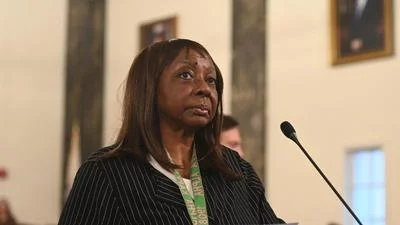Pictured left to right: Eileen O’Neill Burke, Bob Fioretti, Rev. Jesse Jackson | Eileen O’Neill Burke (Facebook), Bob Fioretti (Facebook), Wikipedia Commons
Pictured left to right: Eileen O’Neill Burke, Bob Fioretti, Rev. Jesse Jackson | Eileen O’Neill Burke (Facebook), Bob Fioretti (Facebook), Wikipedia Commons
The Cook County State’s Attorney’s Office (CCSAO) went off script with Kim Foxx over her eight years in office exonerating scores of convicted murders on questionable claims of police and prosecutorial misconduct.
Closer adherence to the rule of law is expected to return under either Eileen O’Neill Burke, the Democratic candidate for State’s Attorney, or Bob Fioretti, the Republican, when the winner on November 5 is sworn into office in January.
Both candidates have promised to keep the Conviction Review Unit in place, the office that reviews allegations of false convictions, but a closer reliance on evidence that substantiates claims of false imprisonment is expected to return as well.
In heavily Democratic Cook County, Burke remains the prohibitive favorite, despite the recent surprise endorsement of Fioretti by long-time, left-wing political activist, the Rev. Jesse Jackson.
In his endorsement of Fioretti, Jackson repeated a charge hurled at Burke during the primary race where she defeated the machine backed candidate Clayton Harris III in March by fewer than 1600 votes.
“When she was a prosecutor, she railroaded an eleven-year-old African-American boy with a coerced confession she knew or should have known was false,” Jackson said in a statement. “During the trial, she called this innocent child, ‘A new whole breed of criminal.’ To our community, this racist statement is disqualifying.”
Burke defended her actions in the case.
“The Appellate Court affirmed the conviction, the [Illinois] Supreme Court denied review of it eight years later, the case went to federal court and federal court found that [the juvenile’s] attorney was wrong in not trying to challenge that confession,” she told Block Club Chicago in March. “Not that the confession was in error, but that his attorney was wrong in not challenging it. Neither that court or any other court has ever questioned my conduct in that case, or in any other case.”
Early in her career, Burke worked as a Cook County prosecutor. She then worked as a criminal defense attorney, before she was elected as a Cook County Circuit Court judge in 2008. In 2016, she was elected judge of Illinois’ First District Appellate Court.
From 2007-2015 Fioretti served as a city alderman. He has run as Democrat for numerous offices, including twice for mayor.
In 2022, he switched parties to run against Toni Preckwinkle for President of the Cook County Board of Commissioners.
Burke and Fioretti differ over the effectiveness of the SAFE-T Act, and provision in it – the Pretrial Fairness Act -- that last September instituted cashless bail.
Burke is on record saying that she supports the SAFE-T Act, but has also vowed to prosecute defendants accused of violent crime more forcefully. The office’s new policy, she said, would be to request detention “each and every time” an arrestee was found with an assault weapon, accused of threatening anyone with a weapon or involved in violent crime on the CTA.
Fioretti favors giving judges more discretion to detain those arrested; those changes require legislative action in Springfield. made in Springfield to the SAFE-T Act that would give judges “more discretion,” he said. They would give a judge to detain a suspect for offenses beyond possession of an automatic weapon.
He is also on record as opposing cashless bail.
In a recent post published in the Chicago Contrarian, former mayoral candidate Paul Vallas wrote that reports of the success of the SAFE-T Act are the product of a public relations campaign.
“The fact remains that pre-trial release as it currently exists in Cook County is leading to more violent crime, particularly in the black community,” he wrote.
He cites CWB Chicago report that nearly 20 percent of felony arrests are committed by people who were released after an arrest and then rearrested for other violent crimes.
“CWB also observed that there are dramatic differences in the determination of detention, in many cases depending on the judge,” Vallas wrote. “Whether this represents a dramatic increase before the county aggressively embraced pre-trial release is not relevant to the thousands of victims of these crimes.”






 Alerts Sign-up
Alerts Sign-up